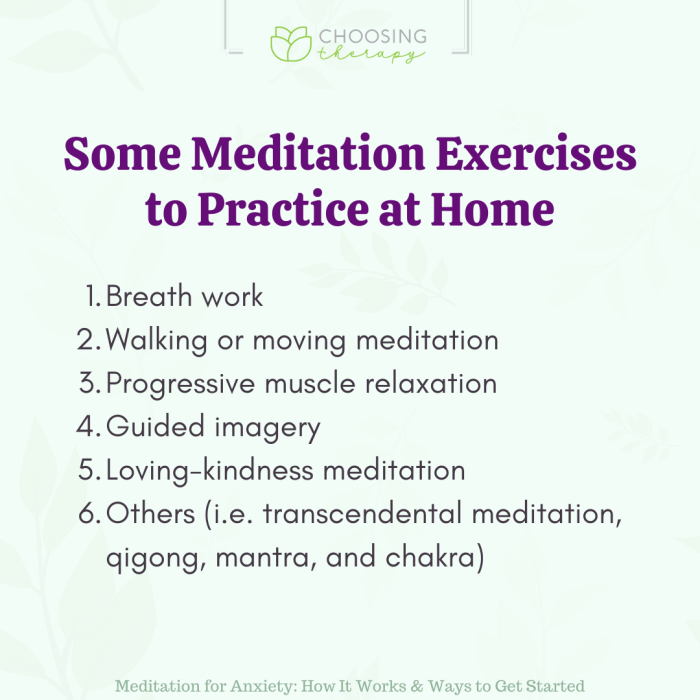How to Meditate for Overcoming Fear and Worry sets the stage for this enthralling narrative, offering readers a glimpse into a story that is rich in detail with an introduction filled with warmth and originality. In a world filled with uncertainties and anxieties, learning to meditate can be a powerful tool to find inner peace and conquer fear and worry.
This guide will explore the transformative benefits of meditation and provide practical techniques to help you navigate through life with a sense of calm and resilience.
As we delve deeper into the realm of meditation, you will discover actionable steps and insightful practices to cultivate a mindful lifestyle that empowers you to overcome your fears and worries. Let’s embark on this journey towards self-discovery and emotional well-being together.
Understanding Meditation for Overcoming Fear and Worry: How To Meditate For Overcoming Fear And Worry

Meditation is a practice that involves training the mind to focus and redirect thoughts. When it comes to managing fear and worry, meditation can be a powerful tool to help individuals cope with anxiety and promote a sense of calmness in their lives. By engaging in regular meditation sessions, individuals can learn to observe their thoughts without judgment, which can ultimately lead to a reduction in the intensity of fearful and worrisome feelings.
Meditation is a powerful tool for overcoming fear and anxiety. Explore these 7 ways meditation can transform your mindset and bring peace to your life.
The Role of Meditation in Alleviating Anxiety
- Meditation helps individuals cultivate mindfulness, allowing them to be present in the moment and let go of anxious thoughts about the past or future.
- Through meditation, individuals can develop a greater sense of self-awareness, which can help them identify the triggers of their fear and worry.
- By practicing meditation regularly, individuals can create a sense of inner peace and reduce the physiological effects of anxiety, such as increased heart rate and shallow breathing.
Benefits of Incorporating Meditation into Daily Routine
- Improved emotional well-being: Meditation can enhance emotional regulation and resilience, enabling individuals to better cope with stressful situations.
- Enhanced focus and concentration: Regular meditation practice can sharpen cognitive abilities and increase mental clarity, reducing the impact of fear and worry on daily functioning.
- Reduced reactivity: By training the mind through meditation, individuals can respond to challenging situations with more calmness and clarity, rather than being overwhelmed by fear and worry.
Different Meditation Techniques for Managing Fear and Worry

When it comes to managing fear and worry through meditation, there are various techniques that can be effective in calming the mind and promoting a sense of peace. These techniques can help individuals combat anxiety and overcome specific fears by cultivating mindfulness and visualization.
Mindfulness Meditation for Anxiety
Mindfulness meditation is a powerful technique that involves focusing on the present moment without judgment. This practice can help individuals struggling with anxiety to become more aware of their thoughts and emotions, allowing them to observe them without becoming overwhelmed.
For those seeking clarity and focus through meditation, there are 10 easy techniques that can help you achieve your goals. Incorporate these methods into your routine for maximum benefits.
- Find a quiet and comfortable place to sit or lie down.
- Close your eyes and focus on your breath, paying attention to the sensation of each inhale and exhale.
- Notice any thoughts or feelings that arise without trying to change them, simply observe them and let them pass.
- Continue to bring your attention back to your breath whenever you get distracted.
- Practice this for a few minutes every day to build your mindfulness muscle and reduce anxiety over time.
Visualization Techniques for Overcoming Fears
Visualization is a powerful tool that can be used in meditation to help individuals overcome specific fears by creating positive mental images. By visualizing a positive outcome or scenario, individuals can reframe their thoughts and beliefs surrounding their fears.
When it comes to meditation, finding the best time of day can make a significant difference in your practice. Check out these 10 tips to discover the ideal time for you.
- Start by finding a quiet place to sit or lie down and close your eyes.
- Imagine yourself in a safe and peaceful environment, free from fear and worry.
- Visualize yourself confronting and overcoming your fear with confidence and courage.
- Focus on the positive emotions and sensations associated with conquering your fear.
- Practice this visualization regularly to rewire your brain and develop a more positive mindset towards your fears.
Creating a Meditation Routine for Coping with Fear and Worry

Establishing a consistent meditation practice is essential when it comes to combating fear and worry. By incorporating meditation into your daily routine, you can cultivate a sense of inner peace and resilience that can help you navigate through challenging emotions.
Tips for Establishing a Consistent Meditation Practice
- Start small: Begin with just a few minutes of meditation each day and gradually increase the duration as you become more comfortable.
- Choose a specific time: Find a time of day that works best for you, whether it’s in the morning before starting your day or in the evening before bed.
- Create a dedicated space: Designate a quiet and peaceful area where you can practice meditation without distractions.
- Set realistic goals: Don’t pressure yourself to meditate for long periods if you’re just starting out. Consistency is key.
- Be patient and kind to yourself: Understand that meditation is a practice, and it’s okay to have days where your mind feels restless.
Strategies for Integrating Meditation into Daily Life
- Combine meditation with other activities: You can meditate while taking a short walk, during your lunch break, or even while commuting.
- Use reminders: Set alarms or notifications on your phone to prompt you to take a few minutes for meditation throughout the day.
- Practice mindfulness: Incorporate mindfulness techniques into your daily activities, such as mindful breathing while doing chores or mindful eating during meals.
- Join a meditation group: Consider joining a meditation class or group to stay motivated and connected with others on a similar journey.
The Importance of Setting Aside Dedicated Time for Meditation, How to Meditate for Overcoming Fear and Worry
Meditation is not just a relaxation technique; it is a powerful tool for cultivating awareness, resilience, and emotional balance. By setting aside dedicated time for meditation, you prioritize your mental well-being and create a space for self-reflection and inner peace. Consistency in your meditation practice can lead to a significant reduction in fear and worry, allowing you to approach life’s challenges with a sense of calm and clarity.
Mindfulness Practices to Enhance Meditation for Fear and Worry

When it comes to overcoming fear and worry through meditation, incorporating mindfulness practices can significantly enhance the effectiveness of your sessions. Mindfulness involves being fully present and aware of your thoughts, feelings, and sensations without judgment. This heightened awareness can deepen the impact of meditation on managing fear and worry.
Examples of Mindful Practices to Combine with Meditation
By integrating mindfulness techniques into your meditation routine, you can better manage stress, anxiety, and fears. Here are some examples of mindful practices that can be combined with meditation:
- Body Scan: This involves focusing on each part of your body, one at a time, and noticing any tension or sensations present. It helps in releasing physical stress and promoting relaxation.
- Deep Breathing: Paying attention to your breath as you inhale and exhale slowly and deeply can calm your mind and reduce anxiety levels.
- Grounding Techniques: Connecting with your environment by focusing on your surroundings, such as the sounds, smells, and textures, can help in staying present and reducing worries about the future.
The Role of Self-Awareness and Acceptance in Mindfulness-Based Meditation
Self-awareness and acceptance play crucial roles in mindfulness-based meditation for overcoming fears. By acknowledging your thoughts and emotions without judgment, you can cultivate a sense of compassion towards yourself and develop the ability to face your fears with courage. This practice of self-acceptance allows you to observe your fears from a place of mindfulness and respond to them in a more constructive manner.
In conclusion, embracing a regular meditation practice can be a game-changer in your quest to conquer fear and worry. By incorporating mindfulness techniques and creating a dedicated routine, you pave the way for a more balanced and harmonious life. Remember, the power to transcend your fears lies within you, waiting to be unlocked through the transformative practice of meditation.